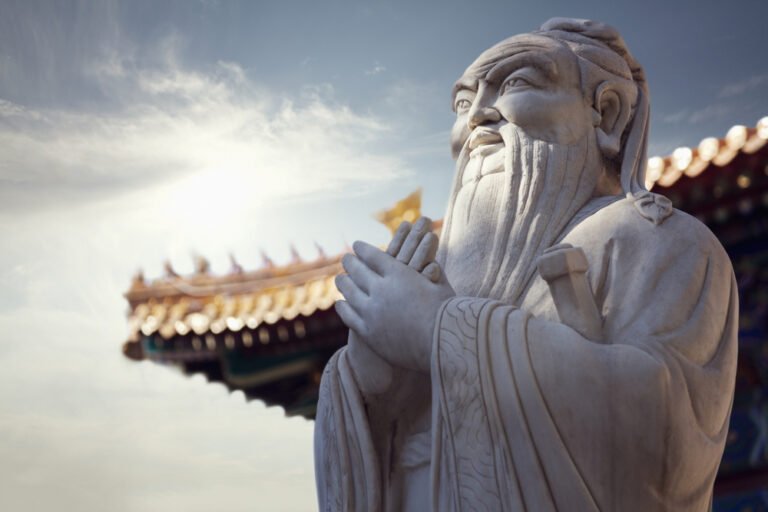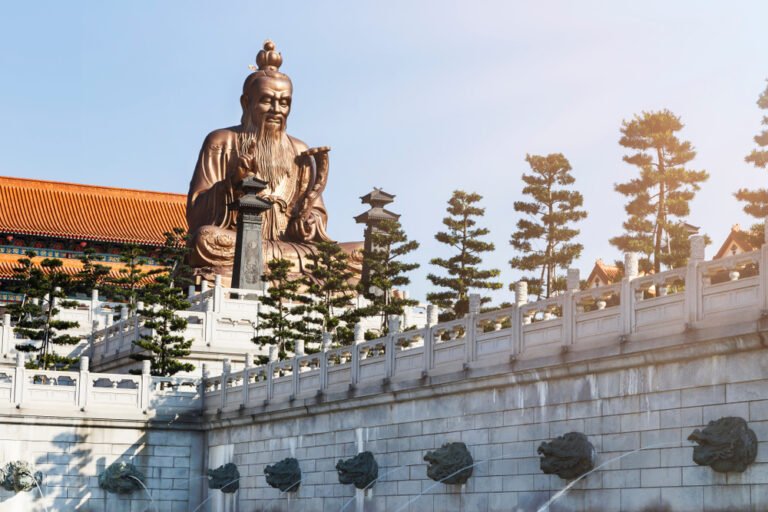Mandarin Blueprint’s Guide to Chinese Philosophy

Welcome to a fascinating journey where the ancient meets the innovative, and learning Chinese becomes about memorizing characters and embracing a culture steeped in rich philosophical traditions. This is our guide to Chinese philosophy, where we’re heading deep into the heart of Chinese culture to uncover how the wisdom of the past can supercharge your language learning today.
Have you ever wondered how The Way in Chinese philosophy could make mastering Mandarin more intriguing? Or perhaps you’ve stumbled upon those profound Chinese philosophy quotes and felt a spark of curiosity light up within you?
You’re in the right place.
Ancient Chinese philosophy isn’t just about highbrow concepts reserved for scholars. Instead, it’s about life’s fundamental truths that resonate deeply with the language itself.
In this guide, we will show you how the timeless wisdom of ancient sages can be your secret weapon in the quest to learn Chinese. Modern Chinese philosophy shapes everyday conversation, and we’re on a mission to make your learning experience as rich and rewarding as possible.
So, whether you’re a total newbie to the language or you’ve been at it for a while and are looking for that extra spark, sit back, relax, and let’s explore how diving into Chinese philosophy can boost your language skills and offer you a whole new lens through which to view the world.
Related Reading: Chinese for the Soul: Chinese Poetry and Language Learning
The roots of Chinese philosophy
Let’s get into the good stuff — the beginnings of Chinese philosophy. It’s a treasure chest of wisdom that’s been passed down through millennia, and guess what? It will make your journey learning Chinese a lot more interesting.
Ancient Chinese philosophy: Foundations and evolution

Picture ancient China, a period buzzing with philosophical exploration. This was when the big guns, like Confucianism, Daoism, and even Legalism, started shaping thoughts and societies. Think of these not just as “schools of thought” but as ways of understanding the world and our place in it.
- Confucianism: Here’s your go-to for all things related to ethics, family, and social harmony. Confucius was like the cool, wise uncle everyone wishes they had, dropping gems about respect and moral uprightness. Check out some wisdom from the man many see as the master of ancient Chinese philosophy:
“It does not matter how slowly you go as long as you do not stop.”
Chinese: 不怕慢,就怕站。
Pinyin: Bù pà màn, jiù pà zhàn.
“Our greatest glory is not in never falling, but in rising every time we fall.“
Chinese: 最大的荣耀不在于从不失败,而在于每次跌倒后都能爬起来。
Pinyin: Zuì dà de róngyào bù zài yú cóng bù shībài, ér zài yú měi cì diē dǎo hòu dōu néng pá qǐ lái.
“By three methods we may learn wisdom: First, by reflection, which is noblest; Second, by imitation, which is easiest; and third by experience, which is the bitterest.“
Chinese: 有三种方法可以获得智慧:首先,通过反思,这是最高贵的;其次,通过模仿,这是最容易的;第三,通过经验,这是最苦涩的。
Pinyin: Yǒu sān zhǒng fāngfǎ kěyǐ huòdé zhìhuì: shǒuxiān, tōngguò fǎnsī, zhè shì zuì gāoguì de; qícì, tōngguò mófǎng, zhè shì zuì róngyì de; dì sān, tōngguò jīngyàn, zhè shì zuì kǔsè de.
It’s safe to see just how relevant these nuggets from Confucius might apply to your language-learning journey, right?
- Daoism (Taoism): Have you ever heard of “going with the flow”? That’s Daoism in a nutshell. It teaches about The Way and how living in harmony with nature and the universe is the ultimate vibe. Here are some Taoist quotes you may have already heard:
“Knowing others is intelligence; knowing yourself is true wisdom. Mastering others is strength; mastering yourself is true power.“
Chinese: 知人者智,自知者明。胜人者有力,自胜者强。
Pinyin: Zhī rén zhě zhì, zì zhī zhě míng. Shèng rén zhě yǒu lì, zì shèng zhě qiáng.
“Nature does not hurry, yet everything is accomplished.”
Chinese: 自然无为,而无不为。
Pinyin: Zìrán wú wéi, ér wú bù wéi.
“Flow with whatever may happen and let your mind be free: Stay centered by accepting whatever you are doing. This is the ultimate.“
Chinese: 随遇而安,顺其自然,心无挂碍。
Pinyin: Suí yù ér ān, shùn qí zìrán, xīn wú guà ài.
Of course, there’s a lot more to Chinese philosophy than Confucianism and Daoism. Let’s break down the timeline a bit.
Related Reading: The Definitive Guide to Chinese Proverbs, Sayings, and Quotes
The timeline of Chinese philosophy
The evolution of Chinese philosophy from its ancient roots to modern times follows a complex and interwoven timeline, reflecting China’s rich history and cultural changes. Here’s a simplified overview to help you understand the progression and interaction of major philosophical schools over time:
Early beginnings (Before 11th Century BCE)
- Shamanistic and ancestral worship: Early Chinese spirituality focused on nature, ancestors, and the cosmos, laying the groundwork for later philosophical thoughts.
Zhou Dynasty (1046–256 BCE): The Hundred Schools of Thought
- Confucianism (6th century BCE): Founded by Confucius, focusing on ethics, morality, and social relationships. It emphasizes respect for elders, filial piety, and benevolence.
- Daoism (Taoism) (6th century BCE): Attributed to Laozi, Daoism emphasizes living in harmony with the Dao (The Way), advocating simplicity, spontaneity, and harmony with nature.
- Legalism (5th century BCE): Emphasizes strict laws and harsh punishments to maintain state order and discipline. Prominent during the Qin Dynasty (221–206 BCE) under the First Emperor.
- Mohism (5th century BCE): Founded by Mozi, advocating universal love, meritocracy, and opposition to war and aggression.
- Other schools include Yin-Yang, School of Names (Logicians), and Agriculturalism.
Imperial China (221 BCE–1912 CE)
- Qin and Han Dynasties (221 BCE–220 CE): Legalism dominated early Qin but was soon replaced by Confucianism as the official ideology in the Han Dynasty, integrating with legalist policies.
- Sui and Tang Dynasties (581–907 CE): Buddhism, introduced from India, flourished and synthesized with Daoism and Confucianism, influencing Chinese thought, art, and culture.
- Song Dynasty (960–1279 CE): Neo-Confucianism emerged, blending Confucianism with Buddhist and Daoist elements, focusing on ethics, metaphysics, and social philosophy.
Modern Era (1912–Present)
- Early 20th Century: The May Fourth Movement (1919) criticized traditional Confucian values, advocating for science, democracy, and modernity.
- Communist era (1949–Present): Marxist and Maoist ideologies became prominent. Confucianism and other philosophies were suppressed during the Cultural Revolution (1966–1976) but have seen a resurgence in interest and study in recent decades.
- 21st Century: Revival and re-evaluation of traditional Chinese philosophies, integrating them with modern values and socialism with Chinese characteristics. Confucianism, in particular, has seen a resurgence as a source of cultural identity and ethics.
This timeline is a broad-stroke view and doesn’t (couldn’t) capture all the nuances and regional variations in Chinese philosophical thought. However, it highlights the dynamic nature of Chinese philosophy, constantly evolving in response to social, political, and cultural changes.
Related Reading: Exploring the Symbols and Rituals of Chinese Death Customs
Chinese philosophy quotes and their impact

Now, who doesn’t love a good quote? Chinese philosophy is chock-full of them, and they’re not just to make your Instagram feed look deep. These sayings pack powerful lessons that are as relevant today as they were thousands of years ago.
Confucius: “Isn’t it a pleasure to study and practice what you have learned?”
Chinese: 学而时习之,不亦乐乎?
Pinyin: Xué ér shí xí zhī, bù yì lè hū?
This hits home for us language learners, right? It’s all about loving the process.
Laozi: “The journey of a thousand miles begins with a single step.”
Chinese: 千里之行,始于足下。
Pinyin: Qiān lǐ zhī xíng, shǐ yú zú xià.
Talk about motivation to keep moving forward in your Mandarin lessons.
These (and many more) ancient Chinese philosophy quotes are more than just words. They’re a way to see the world and a guide on how to live in it. And as you’re learning Chinese, you’ll find that these philosophies aren’t just abstract concepts. They’re embedded in the language, the basic Chinese characters you write, and the idioms you’ll learn to say.
So, as we head deeper into these philosophical roots, remember that you’re not just learning a language, you’re getting a front-row seat to thousands of years of wisdom. And who knows? This ancient wisdom might just be the secret sauce to supercharge your Mandarin learning journey.
The interplay of Chinese philosophy and language
Alright, folks, buckle up. We’re about to dive into one of the coolest parts of learning Chinese: discovering how deeply Chinese philosophy is woven into the language. It’s like finding secret messages in a treasure hunt, where each character and phrase holds a piece of ancient wisdom waiting to be uncovered.
The Language of Philosophy
Have you ever looked at a Chinese character and thought, “Wow, there’s a whole story in here”? Well, you’re not wrong. Not only are plenty of Chinese characters often sentences within a word but many characters are built on philosophical concepts, giving you a peek into the minds of those ancient philosophers every time you use them.
For instance, let’s talk about The Way in Chinese philosophy. In Mandarin, it’s 道 (dào), as in Daoism (Taoism). This character doesn’t just mean a path or a method; it represents the fundamental principle that governs the universe in Daoist thought. So, when you learn this character, you’re not simply adding a word to your vocabulary, you’re also connecting with a concept that’s been a cornerstone of Chinese thought for centuries.
Philosophy in modern Chinese language learning
Now, how does this all tie into learning Chinese? Imagine using stories and mnemonics like the Hanzi Movie Method but inspired by these philosophical concepts to remember how to read, write, and speak. It’s like having Confucius and Laozi as your study buddies, guiding you through the nuances of the language with their timeless wisdom.
And it’s not just about memorization. Engaging with these philosophical ideas can deepen your understanding of Chinese culture and help you grasp the subtleties of the language. When you come across idioms or expressions rooted in philosophical thought, you’ll be able to appreciate them on a whole new level.
So remember that you’re not just learning to string sentences together; you’re weaving in threads of ancient wisdom that have shaped how millions think and communicate. Whether it’s pondering The Way while practicing your tone pairs or finding motivation in the words of ancient sages, you’re participating in a tradition that goes way beyond textbooks and language apps.
Who knew that cracking open a Mandarin textbook could feel like unlocking the secrets of the universe? Keep this spirit of curiosity and discovery alive; there’s no telling how far your Mandarin journey will take you.
Related Reading: The Awe of Language Learning
From ancient wisdom to modern application
Alrighty, let’s shift gears and zoom into the present with a fun twist. You’ve been soaking up all that ancient Chinese philosophy goodness, and now you’re probably wondering, “How does this all fit into my life today?” Well, the wisdom of the ancients is far from being just a relic of the past. It’s alive, kicking, and totally relevant to our modern lives, especially when you’re on this thrilling ride of learning Chinese.
<h3>Modern Chinese philosophy: A continuation of tradition

You might think that ancient philosophies would struggle to keep up with our fast-paced, tech-driven world. But guess what? They’ve not only kept pace, they’ve become integral to understanding modern Chinese thought, culture, and even politics. Today’s thinkers and leaders still draw on these age-old philosophies, blending them with contemporary ideas to navigate the complexities of the 21st century.
For example, the principles of Confucianism, with its focus on harmony, respect, and moral integrity, are seen in modern educational systems, in the differences between Western and Chinese business cultures, and even in current social norms.
Daoism, with its emphasis on balance and harmony with nature, echoes loudly in China’s growing environmental movement. So, when you’re learning Chinese, you’re not just memorizing words; you’re getting the inside scoop on the cultural DNA that shapes today’s China.
Chinese religion and philosophy
Now, let’s get a bit mystical and look into how Chinese religion and philosophy intertwine in a way that colors every aspect of life in China. This blend of Confucianism, Daoism, Buddhism, and folk religions is more than spirituality; it’s a holistic way of understanding the world, influencing everything from the many Chinese festivals and rituals to daily manners and ethics.
This fusion makes for a fascinating study, especially when you’re learning the language. Have you ever noticed how many Chinese expressions, idioms, and even slang have roots in religious or philosophical concepts? They’re not simply phrases. They’re echoes of a profound, interconnected worldview that’s uniquely Chinese.
Related Reading: 15 Chinese Words That Don’t Exist in English
The practicality of Chinese philosophy in language-learning
Okay, so how do we tie all this philosophical and religious richness into the nitty-gritty of learning Chinese? Mandarin Blueprint has got you covered, turning what could be a daunting task into an adventure filled with “aha!” moments. Here’s the deal:
- Understanding cultural nuances: Grasping the philosophical underpinnings of the language gives you a leg up in understanding not just what words mean but the why behind them. It’s a cultural compass guiding you through the subtleties and depths of Chinese communication.
- Mindfulness and reflection: Embracing these philosophies can also transform your learning journey into personal growth. Imagine studying Chinese with your mind and your heart, finding moments of zen-like focus and mindfulness amidst the 4th and 5th tones and the Chinese characters. It’s learning a language while also learning a bit more about yourself and the world around you.
So, as we bridge the ancient with the modern, remember that learning Chinese is more than just an academic exercise. It’s an invitation to explore a rich cultural landscape, where every character and every phrase brings you closer to understanding a civilization that’s been pondering the big questions for thousands of years.
Unlock your path to Mandarin mastery
And there we have it, folks — a whirlwind adventure through the lush landscapes of Chinese philosophy and how it intertwines beautifully with the journey of learning Mandarin. We’ve seen how ancient wisdom from the likes of Confucius and Laozi isn’t just for the philosophical ponderers but is a vibrant, living part of mastering this incredible language. It connects you with centuries of thought, culture, and insight in a way that enriches our language skills and our lives.
But wait, there’s more to this adventure, and it’s where you come in. Ready to turbocharge your Mandarin learning experience? Want to learn how you can weave Chinese philosophy into your study routine to make learning Mandarin faster and easier?
Imagine having a roadmap that doesn’t just tell you where you are but shows you exactly how to reach your destination of fluency. That’s what the Mandarin Fluency Scorecard is all about.
By completing the FREE Mandarin Fluency Scorecard, you’re not only taking a fun quiz but also taking the first step on a journey of discovery. You’ll get an assessment of your current Chinese skill level and a personalized guide to fluency, which identifies your personal weaknesses and barriers that might be holding you back. Then, you’ll get a custom report brimming with immediate action steps, allowing you to discover the next step based on your current level and how to leap over those hurdles toward fluency.
And the best part? It’s completely FREE and takes under 60 seconds.
Whether you’re just starting out or looking to break through to the next level, the Mandarin Fluency Scorecard is your key to a tailored learning experience with cutting-edge language learning strategies.








